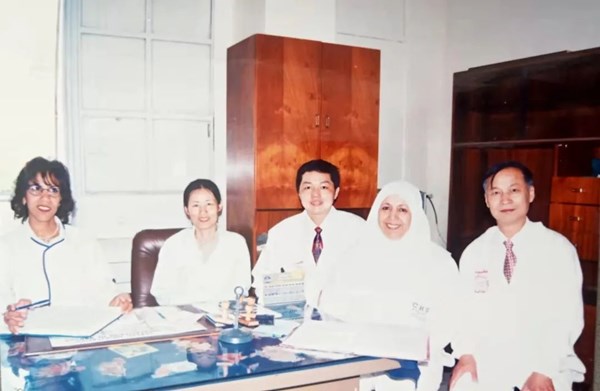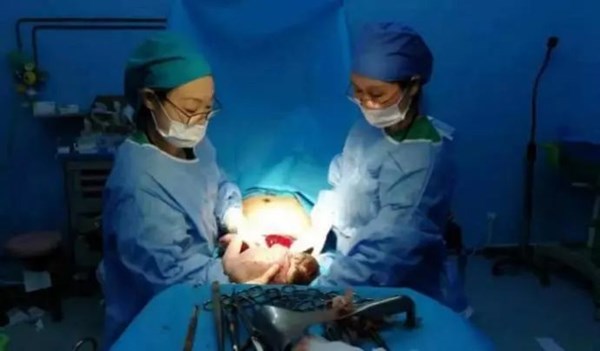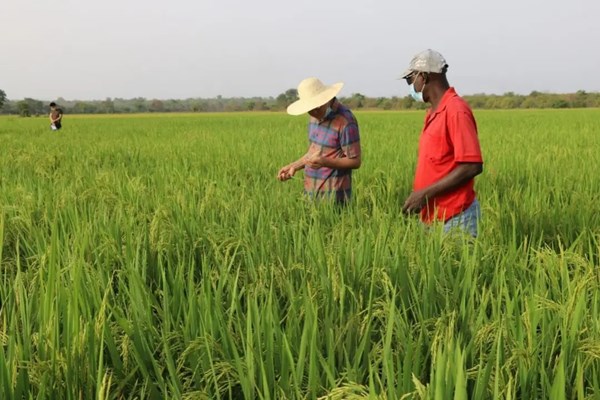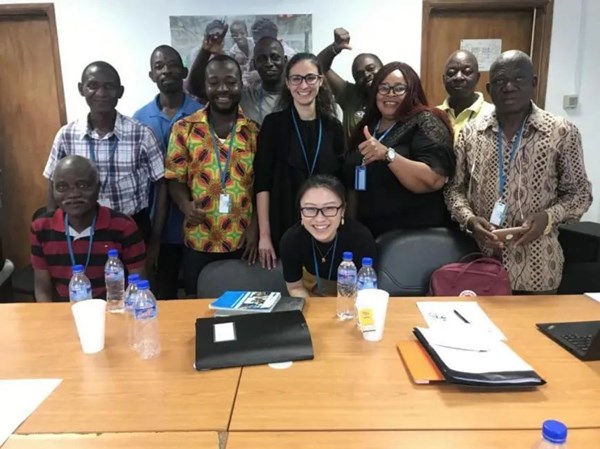Wuhan University contributes to 60 years of China-Africa cooperation
Although thousands of miles apart, their common desire to seek national independence and pursue democracy and prosperity have bound Chinese and Africans as a community with a shared future. China and Africa initiated diplomatic ties in 1956. As one of the earliest participants in building the China-Africa community, Wuhan University (WHU) has made decades of efforts in areas including healthcare, education, sci-tech cooperation and volunteer services.
Medical aid and exchanges in medical technology contribute to the building of a China-Africa community of health
WHU started its journey in Africa in April 1963 in Algeria, which had just won a battle against France in the previous year and was facing large shortages of medicine and medical care. A medical team from the Second Affiliated Hospital of Hubei Medical College (now the Zhongnan Hospital of WHU) was dispatched from China to Algeria as one of China's first three medical aid teams to be sent to Africa. The First Affiliated Hospital of Hubei Medical College (now the Renmin Hospital of WHU) and the Stomatological Hospital Affiliated to Hubei Medical College (now the School of Stomatology of WHU) joined the foreign aid mission respectively in 1965 and 1968 to African countries that included Algeria and Lesotho.

Plastic surgeon Wang Songshan from the Renmin Hospital of Wuhan University (C) on a medical aid mission at the affiliated hospital to Annaba University Medical College in Annaba province, Algeria.
Within the past nearly six decades, WHU has dispatched over 330 key medical personnel to Africa. Presently there are two doctors and one nurse on a mission in Algeria. Their jobs have ranged from health services for different levels of hospitals and healthcare for senior government officials to emergency deliveries, covering more than 20 disciplines, including internal medicine, surgery, gynecology, pediatrics, anesthesia, traditional Chinese medicine and stomatology, benefiting hundreds of thousands of patients.
They have brought advanced medical technologies, equipment and much needed medicine to local people. Their efforts have also been recognized and commended by both the Algerian and Chinese governments. For instance, 35 team members have received honorary titles of role models at the national and provincial levels. The Zhongnan Hospital of WHU was granted awards twice for their excellence in the country's medical foreign aid missions.
Since the beginning of the 21st century, WHU has deepened medical exchanges with medical institutions in multiple African countries, including Tanzania and Kenya, aiming to “teach them how to fish” via technology transfers and talent training programs.
Starting from December 2015, the Zhongnan Hospital of WHU held a training program for gene detection and clinical transformation technology at the University of Abomey-Calavi in Benin. With its help, the African country's first judicial gene detection center was established in 2020. Remote consultations were also carried out to help diagnose complicated cases. In the future, more in-depth cooperation will be carried out between WHU and African medical institutes in areas including medical 5G wireless networking, medical digital design and surgical robot remote coordination.

Gynecologists Yang Guifen and Yang Lingyun from the Zhongnan Hospital of Wuhan University on a medical aid mission at the Batna Maternity Hospital in Batna province, Algeria.
Talent incubation and exchanges contribute to the building of a China-Africa community of education
Education is a key area of China-Africa exchanges. WHU was one of the first universities to recruit African students after China's reform and opening-up in 1978. Since 2000, the university has enrolled 2,180 African students from 52 countries. Presently there are 311 students from 47 African countries on campus, with 187 more attending online courses. Over the past 40 years, WHU has nurtured a large group of talents with fluent Chinese and professional knowledge, contributing to Africa's fast development and China-Africa cooperation. Vice-Minister of Justice of Liberia Cox Juan Nancy, renowned cardiologist Dr. Mohamed Hussein Salimu from Kenya, and Thamik Hanane from Morocco are just a few of the outstanding Africans graduating from WHU.
Since 2010, WHU has established close ties with over 10 universities in African countries, including Benin, Mali, Zambia, Egypt, Senegal, Morroco, Tunis and Zimbabwe. It has launched a postgraduate joint training program and a research course on African issues in French-speaking countries in Africa. In 2017, WHU proposed establishing a higher education alliance with universities in France and Africa and hosted a higher education forum for three consecutive years. By doing so, a multilateral exchange and dialogue platform and mechanism on higher education was established between China, France and Africa.
Sci-tech cooperation and technology transfer contribute to the building of a China-Africa community of science and technology
Deepening sci-tech cooperation and knowledge sharing is a mutual pursuit by both sides. Based on its disciplinary advantages in the French language, agriculture, water conservancy, hydropower and healthcare, WHU has extended scientific research cooperation and transfers and sharing of high-tech achievements with African countries, helping to meet the needs of socioeconomic development in Africa.
In 2010, WHU and Benha University in Egypt jointly established the Center for African Studies, which was backed up by the Chinese government and related authorities. Furthermore, WHU has been proactively involved in the China-Africa Joint Research and Exchange program, which includes over 20 universities in China and Africa, further expanding scientific research cooperation with African universities.

The Honglian hybrid rice developed by Wuhan University is in trial breeding in Africa.
Since 2012, WUH-developed Honglian hybrid rice has started trial breeding in several African countries, including Mozambique, Namibia, Kenya and Chad. The yield of Honglian hybrid rice is 10.84 tons per hectare, more than 85 percent higher than that of African local varieties. The latest generation of Honglian hybrid rice has been introduced to Kenya for trial breeding and promotion. The introduction of the hybrid rice was a big contribution in eliminating starvation and poverty in Africa and maintaining global food security.
In terms of water conservancy and hydropower construction, WHU has applied its latest research achievements in water conservancy and hydropower construction projects in Africa. Its faculty from the water conservancy and hydropower college has participated in the design and construction of over 10 projects in Africa, including the Karuma Hydroelectric Power Station in Uganda and the Genale Dawa III Power Station in Ethiopia. A number of ministerial and UN research projects have also been carried out jointly by WHU and universities in Africa.
Volunteer service contributes to the building of a China-Africa community of sustainable development
It has always been a goal of WHU to nurture talents with a global vision, social responsibility and a humanistic spirit. Over the years, groups of WHU students and alumni have crossed the oceans and devoted themselves to the modernization of Africa, covering areas such as healthcare, infrastructure, culture and education, science and technology, women's and children's development, poverty reduction and environmental protection.

Han Yue (C) , a 2007 undergraduate in the Department of French, School of Foreign Languages, Wuhan University works at the UNICEF regional office for West and Central Africa.
As Professor Tang Qizhu, WHU's vice chancellor, said at the first China-Africa Innovation Cooperation Conference held on Dec 12, 2021, WHU will give full play to its advantages and implement the Chinese central leadership's instructions that were given at the Beijing Summit of the Forum on China-Africa Cooperation (FOCAC) in 2018 and the Eighth Ministerial Conference of the FOCAC in 2021, fulfill its mission and contribute momentum and vitality to China-Africa cooperation.

Follow us on WeChat
京ICP备18041594号-1
京公网安备 11010202005508号

Follow us on WeChat


